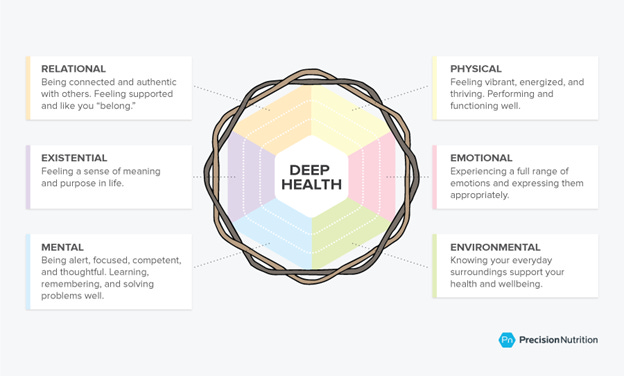
Drowning in a sea of health advice, fad diets, and ever-changing trends? Deep health cuts through the noise—it's not just about looking fit but about thriving in every aspect of life, from your mind to your relationships.
First impression of the phrase deep health might be a little intense and intimidating.
What makes health deep?
Does that mean other forms of health are shallow?
And how can it work for an already busy life?
At its core, deep health is about more than just diet and exercise—it’s a holistic view of well-being that evolves over time. It consists of six interconnected dimensions:
Physical – Your body’s condition, energy, and composition
Mental – Cognitive function, focus, and learning
Emotional – The depth and range of your feelings
Existential – Your sense of purpose and fulfillment
Relational-Social – Your connections and support systems
Environmental – The spaces and resources that impact your well-being
Caring for one area of health often creates a ripple effect, naturally improving others along the way. Prioritizing sleep, for example, can boost mental clarity, emotional resilience, and even physical performance.
The Six Dimensions of Deep Health
Physical Health - The Foundation of Energy
Your physical health is shaped by factors like hormones, movement, sleep, hydration, and nutrition.
While you can’t control everything, small habits—like strength training for bone health, prioritizing protein, or staying hydrated—can have a big impact. Supporting your body’s changing needs helps sustain long-term energy and vitality.
Mental Health - Clarity, Focus & Growth
Mental health isn’t just about managing stress—it’s about keeping your mind sharp, adaptable, and engaged. Whether you’re balancing career shifts, caregiving, or personal reinvention, mental resilience is essential.
Daily habits like mindfulness, brain-stimulating activities, and setting boundaries can help protect your mental well-being.
Emotional Health - Understanding & Managing Feelings
Midlife brings emotional highs and lows, from the joy of new opportunities to the weight of life transitions.
Emotional health isn’t about suppressing feelings but about processing them in a healthy way.
Whether through journaling, deep conversations, or therapy, acknowledging and navigating emotions strengthens overall well-being.
Existential Health - Meaning & Purpose in Midlife
Who are you beyond your roles? What brings you fulfillment? These are questions that become even more important over 40.
Finding purpose—whether through passion projects, career shifts, or community involvement—enhances overall health and happiness.
Relational-Social Health - The Power of Connection
Strong relationships are essential for well-being, especially in midlife. Whether maintaining deep friendships, nurturing family bonds, or forming new social circles, connection fuels resilience.
Prioritizing time with supportive people and setting boundaries with draining relationships can be transformational.
Environmental Health - The Impact of Your Surroundings
Your environment—home, work, and even the people around you—deeply affects your health.
Creating spaces that support wellness, whether through decluttering, nature exposure, or toxin-free living, contributes to a thriving life.
Small changes, like optimizing sleep environments or spending time in green spaces, can have profound effects.
Deep Health Is a Continuous Journey
Focusing on all six dimensions may seem overwhelming, but they naturally support each other. A daily walk with a friend, for example, boosts physical, social, and emotional health all at once.
The goal isn’t perfection—it’s progress toward a balanced, vibrant life.

